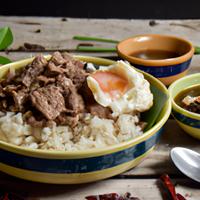
1 serving (250 grams) contains 500 calories, 25.0 grams of protein, 20.0 grams of fat, and 60.0 grams of carbohydrates.

Log this food in SnapCalorie

Nutrition Information
Calories |
471.7 | ||
|---|---|---|---|
% Daily Value* |
|||
| Total Fat | 18.9 g | 24% | |
| Saturated Fat | 6.6 g | 33% | |
| Polyunsaturated Fat | 0 g | ||
| Cholesterol | 47.2 mg | 15% | |
| Sodium | 754.7 mg | 32% | |
| Total Carbohydrates | 56.6 g | 20% | |
| Dietary Fiber | 1.9 g | 6% | |
| Sugars | 4.7 g | ||
| protein | 23.6 g | 47% | |
| Vitamin D | 0 mcg | 0% | |
| Calcium | 28.3 mg | 2% | |
| Iron | 1.9 mg | 10% | |
| Potassium | 283.0 mg | 6% | |
* Percent Daily Values are based on a 2,000 calorie diet. Your daily values may be higher or lower depending on your calorie needs.
Food Attributes
Source of Calories
About Rice moo krop
Rice Moo Krop is a popular dish rooted in Thai cuisine, featuring crispy pork belly served atop steamed white rice. The pork is typically seasoned, slow-cooked, and deep-fried to achieve its signature crunch, with a flavorful caramelized exterior. Often accompanied by a side of sweet chili sauce or savory gravy, this dish is further enhanced with fresh cucumber slices and cilantro for a refreshing contrast. While Rice Moo Krop provides protein from the pork, its high fat content, due to the frying process, makes it indulgent rather than inherently healthy. White rice offers energy-boosting carbohydrates but lacks the fiber found in whole-grain options. However, the addition of fresh vegetables adds vitamins and minerals that balance the dish slightly. Moderation and portion control are key if you're mindful of calorie intake while enjoying this classic Thai comfort food.



